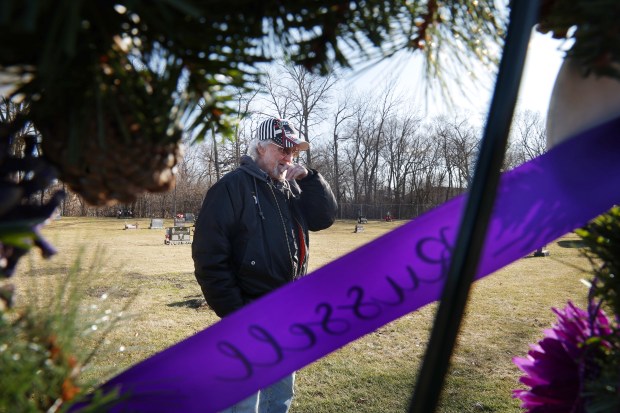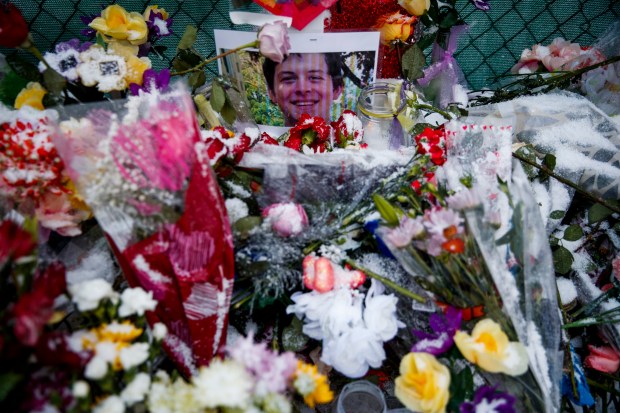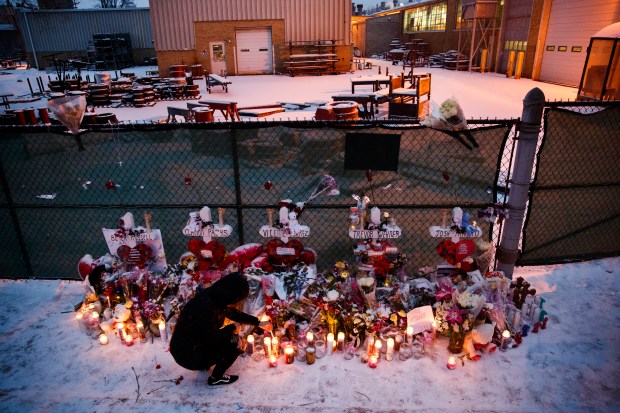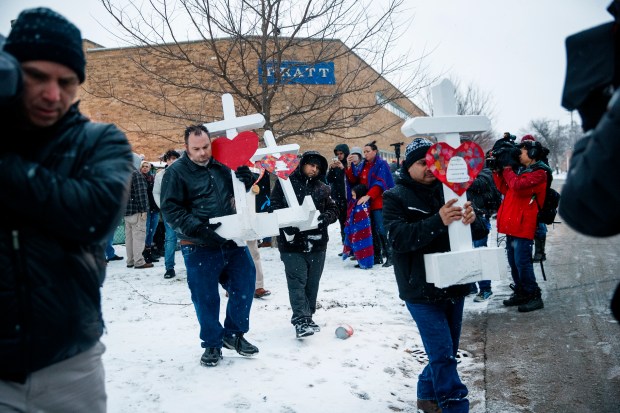Diana Juarez, 38, likes to tell stories about her father with her mother, her siblings and her own children. About how he loved to work on cars, how he would wear matching Cubs or Bears jerseys with his family when there were games going on, the little jokes and sayings he repeated to them.
Juarez was close with her father, Vicente. She’s a teaching assistant in Oswego, and lives in the house Vicente lived in, along with her kids, her mother and her younger brother.
“I had just texted my mom on Monday to tell her, like, I thank God every day for her being my mom and for her choosing my dad as my dad,” Juarez told The Beacon-News.
This time of year is particularly difficult, as the anniversary of Vicente’s death approaches. Juarez was one of five people killed in the Feb. 15, 2019, mass shooting at the Henry Pratt Co. in Aurora.
“It doesn’t get easy,” Juarez said on Wednesday. “I know people say that it gets easy. But as soon as February hits, it’s like, I don’t know, we still have that hope that we’re still all dreaming, that this is just a big old nightmare.”
For the victims’ families and several witnesses, the nightmare is compounded by a protracted lawsuit against the Illinois State Police. The wrongful death suit, filed shortly after killings, blames the state police for allowing the shooter to possess a gun even though the agency knew he was a convicted felon and prohibited from owning a firearm.
After nearly six years without significant movement in the case, the families recently filed court documents alleging the state was intentionally dragging out the proceedings and had failed to turn over evidence critical to their claim.
Five Henry Pratt employees — including Juarez — were killed, another wounded, and five Aurora police officers wounded, after a disgruntled co-worker opened fire during a termination meeting inside the Pratt warehouse. The gunman was ultimately killed in a shootout with police.
Those who were killed by the gunman included Juarez, a beloved father and grandfather; Josh Pinkard, who was a husband and Mississippi State sports fan; Russell Beyer, a union leader, and the son of a Vietnam War veteran; Clayton Parks, the company’s human resources manager and an Elgin father with a young son; and Trevor Wehner, a student at Northern Illinois University on his first day of work as an intern at Pratt.
One other employee, Timothy Williams, was shot, but managed to escape and flee.
At least seven lawsuits have been filed against the state in relation to the shooting, according to past reporting. They accuse the Illinois State Police of negligence for improperly issuing a firearm owner’s identification card — commonly called a FOID card — to the shooter, Gary Martin, and for not ensuring that he surrendered his weapon once his license was revoked.
Martin had been convicted of felony aggravated assault in 1995 in Mississippi, which would have made him ineligible for a FOID card, but records show this conviction was not entered into national databases. He passed two background checks in 2014 — one to get his gun license, and another to purchase the handgun he later used to kill several of his colleagues.
When Martin was later fingerprinted to apply for a license to carry a concealed weapon, the database had criminal records not included in other criminal databases, linking Martin with the 1995 felony.
The Illinois State Police have said previously they notified both Martin and the Aurora Police Department that he was not able to possess a gun. He was given 48 hours to surrender his weapon to a qualified owner or to local authorities, but did not comply. Aurora officials have said they have no record of receiving notice from the Illinois State Police.
The Illinois State Police declined to comment, citing a policy against discussing pending litigation. The Illinois attorney general’s office also declined to comment due to the ongoing litigation.
On Tuesday, in response to a motion to dismiss filed by the state in January, the witnesses of the shooting and families of the victims their individual pleadings into a single lawsuit in the Illinois Court of Claims, records show. The complaint continues to allege that the Illinois State Police improperly approved Martin’s FOID card, failed to properly revoke it and through additional failures “caused or substantially contributed to the mass shooting.”
In Tuesday’s joint motion, they reiterated their request for the state to turn over evidence relevant to the case. This includes, the motion says, “documents and testimony directly related to the Illinois State Police’s failures with respect to the FOID card process.”


The lawyers and families have been “met with constant delay tactics by the Illinois State Police and their representative counsel,” according to Martin Dolan, an attorney for the Juarez family and the two witnesses who are part of the lawsuit. “It’s getting to a point after six years where we have to do everything in our power to move this case to the point of justice.”
“The most recent motion (by the state) is just a continuation of the systematic tactics that we’ve been facing all along in this case,” Dolan told The Beacon-News.
A 2019 Chicago Tribune investigation found that nearly 27,000 Illinois residents from 2015 to 2019 did not inform authorities about what they did with their guns after their FOID cards were revoked. That amounts to 78% of revoked cardholders during that time. Domestic violence-related infractions were the most common reason for a card to be revoked, the Tribune’s analysis showed, followed by mental health concerns and felony convictions.
From the records analyzed by the Tribune, there were just over 30,000 inquiries into purchasing a gun by Illinois residents with revoked cards who did not submit paperwork about what they did with their guns. These inquiries do not necessarily always result in the purchase of a gun, but the records also did not account for guns inherited or obtained in a private sale, nor did they reflect whether more than one firearm was purchased in a single sale.
Illinois State Police Director Brandon Kelly made revocation compliance a priority when he took office, according to past reporting. And, since the Pratt shooting, Illinois State Police has since made Firearms Transfer Inquiry Program data available to local law enforcement via an internet portal.
An analysis by the Cook County sheriff’s office in 2024 found that more than 112,000 Illinois residents have had their FOID cards revoked, but the state has not accounted for whether 84,000 of them turned in their guns.
The Pratt shooting drew attention to FOID revocation policy in the state, but it is not the only instance where a revoked cardholder committed an act of violence with a weapon they should not have possessed. In September 2019, a man with a revoked gun license killed his 18-month-old son in Joliet using one of at least three handguns he possessed and had been ordered to surrender in January 2018, after being charged with aggravated battery for brutally beating a man in a Naperville parking lot.
Despite state lawmakers allocating $2 million for revocation enforcement efforts statewide in the years since, the state’s statistics on accounting for revoked cardholders’ guns have remained largely unchanged.
And now, six years after the Pratt shooting and the subsequent public outcry about FOID card revocation procedures, the victims and witnesses — and the city of Aurora — are still trying to heal.
Like Diana Juarez, this time of year is also hard for Gregory Sims, 58. He says his nightmares get worse as the date creeps closer to the anniversary of his co-workers’ slayings.
“When it gets closer to this time, the nightmares just seem to … it keeps me from sleeping,” Sims said. “I try to stay up late as I can so I try not to dream about what I witnessed that day.”
Sims, of Aurora, said he missed his daughter’s graduation, anniversary celebrations with his wife and family reunions in recent years because of the mental toll the shooting has taken on him.

It’s the same for Billy Dancy Jr., 54.
“I feel like it happened a week ago,” Dancy, who lives in Plainfield, said, adding that his nightmares get worse this time of year. “Even my own mother says that she sees I’m different.”
Both men were working in Pratt’s warehouse when the shooting happened. Now, they are plaintiffs in the lawsuit against the state.
The plaintiffs currently are waiting Illinois Court of Claims Commissioner Joseph Cavanaugh to rule on their evidence request.
And, as the individuals affected by the shooting continue to wait for a resolution, they lean on family to get through these times and find ways to cope.
“We just kind of take it day by day,” Sims said of his family’s support. “When they notice that I’m kind of like, in those moments, you know they kind of give me the space to … work through it.”
But it’s hard not to imagine how things might be different.
“Six years of, like, memories that he can no longer have with us, and we can’t have with him,” Diana Juarez said about her father.
She said the whole family went to him for anything they needed — and that he was always ready to lend a hand.
“Now, we have to (do) hard stuff on our own,” she said.
One of Diana Juarez’s daughters is celebrating her 15th birthday this coming August. In Hispanic cultures, a girl’s 15th birthday is an important milestone, Juarez explained. It symbolizes growing up.
“She would always say that when she turned 15, she was going to dance with her grandpa,” Juarez said about her daughter.
Vicente was like a father figure to her children, Juarez explained.
“It’s really hard for her to even want to celebrate it,” she said, “because he promised her he was going to be here when she turned 15.”





